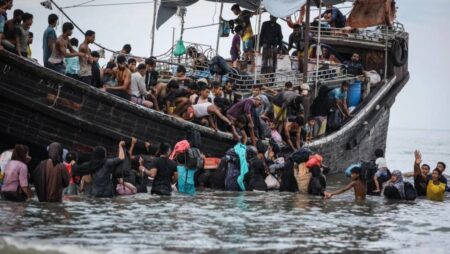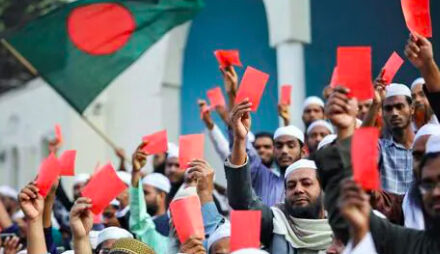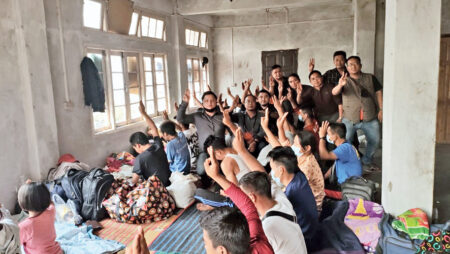VOICES FROM THE REGION#02: 22 AUGUST 2016
Kashmir: Blame game isn’t Policy
–
–
–
—
—
—
—
Raja Muzaffar Bhat
—
–
Abstract
Kashmir is on a boil. In the absence of political measures, the situation can further worsen. The discourse over bringing normalcy to Kashmir must be based on a meaningful dialogue and democratic means that address the grievances of the people of Jammu, Kashmir, and Ladakh including the part of Kashmir under control of Pakistan.
–
The death toll during ongoing crises in Kashmir valley has crossed 60. As per media reports around 4000 people are injured out of which 150 young men and few girls have been blinded due to severe eye injuries. New Delhi which is the main stake holder in Kashmir’s political discourse instead of taking some political initiatives continues to blame Pakistan for all the messy state of affairs. By leveling charges against Pakistan for the present crises, Government of India relegates Kashmir as a law and order problem. It is undeniable that Pakistan supports and trains Kashmiri militants. Today, however, the situation is changing. The influence exercised by the local Kashmiri militants is much more than those coming from Pakistan and this is a cause for worry.
The ongoing anti India protests are quite different from the agitations that took place in 2008 and 2010. The reason behind 2008 agitation was Government’s decision to allot land to Shri Amarnath Shrine Board (SASB) at Baltal Sonamarg and subsequent economic blockade by Jammu based traders. Similarly the 2010 summer agitation started in the aftermath of a fake encounter in Machil wherein some ordinary Kashmiris were branded as militants and killed subsequently in an alleged encounter by Army. But the present agitation was spontaneous and it erupted after a 22 year old commander of Hizbul Mujahideen Burhan Wani was killed in an encounter with Special Operations Group (SOG) of Police at Kokernag in South Kashmir. Some reports say that said encounter was also staged and fake, as SOG had arrested Burhan by making him and his associates unconscious inside their hideout. PDP Parliamentarian Muzaffar Hussain Beigh also expressed similar views during a TV interview recently. Notwithstanding the truth or lack of it in these allegations, Wani today is a household name.
Burhan: A role model for the youth?
When Burhan was alive and used to post his and his group’s pictures on social media, he had become what media described as a “Poster Boy”of Kashmir’s armed resistance. He was being compared with Cuban revolutionary Che Guevara. Burhan’s fan-following was limited to a selected group of young Kashmiris, but after death, his popularity surged. This may be a dangerous trend, but we cannot shy away from these facts. The main reason for this fan-following is that Burhan neither went to Pakistan for arms training nor did he seek active support from across the border for his militant activities. When he was laid to rest an estimated 100,000 people are said to have offered Nanaz e Janazah (funeral prayers). Noted Pakistani actor Hamza Ali Abbasi, known for his liberal and secular views, paid tributes to Burhan on his Facebook wall:
“Look at this man. He is not an ISI agent, he is not a Mullah inspired Pakistani funded militant. He is Burhan Wani Shaheed. A KASHMIRI who joined the freedom struggle of Kashmir when his brother was killed by Indian Army. If KASHMIR issue is not resolved according to the will of Kashmiris and UN Resolutions, we have another PALESTINE in the making right in our backyard.”
The status update on Abbasi’s wall was later-on removed by the Facebook administration.
Kashmir: Not an administrative issue
Successive regimes in New Delhi have treated Kashmir as an administrative issue. Whenever people came in huge numbers to vote during assembly and panchayat elections, Government of India used to equate these elections with normalcy in Kashmir and as a referendum in its favour. Recently Former Union Home Minister P Chidambaram in a TV interview spoke about greater autonomy to Jammu & Kashmir. But his own tenure was marked by no progress on that front.
A 39-member delegation of Indian Members of Parliament (MPs) came to Srinagar during 2010 agitation. P Chidambaram was heading that delegation. Senior Hurriyat leader, Syed Ali Shah Geelani, who was spearheading 2010 agitation had rejected the invitation to meet on the grounds that the delegation wanted to treat Kashmir as India’s internal problem. Moderate pro-freedom leaders Mirwaiz Umar Farooq and Yasin Malik had also turned down invitations, but they sent a joint memorandum to the delegation reiterating their demands for restoration of normalcy and the initiation of dialogue.Their demands included “demilitarization” along with the release of detainees and the “withdrawal of the draconian laws”. A section of the delegation, however, later called on Geelani and Mirwaiz at their residences, where both the leaders reiterated their position and conditions for restoration of normalcy and settlement of the long-pending dispute of Kashmir. Neither did New Delhi initiate demilitarization process nor were the draconian laws revoked in-spite of the fact that militancy had almost declined for more than a year or so post-2010 agitation. Now we are again witnessing protests and the matter of concern is that these protests have erupted not because of any human rights violation or any other similar issue, but this was triggered by the death of Burhan Wani.
Interlocutors’ Report
Government of India appointeda group of interlocutors on 13 October 2010. The Group had submitted a report to the Home Ministry in March 2012. They had recommended several measures to be taken for addressing Kashmir issue which included setting up of a Constitutional Committee (CC) to review all the central Acts that have been extended to J&K since 1952 and submit its findings within a period of six months; appointment of Governorto the state on the recommendation of J&K Government; non-extension of central laws; strengthening of article 370;and separate Regional Councils for Jammu, Kashmir and Ladakh. Other recommendations pertained to addressing social, cultural and economic aspects of the state. For two years the government sat over the report before its electoral debacle. Decline in the levels of militancy related violence had probably created an illusion of peace in New Delhi making the report somewhat useless for the government. Political considerations, i.e. discussing the report might lead toCongress’ defeat in 2014 general elections too played a role. Afzal Guru was hanged in February 2013. The party still lost the elections.
Tailpiece
Kashmir continues to simmer and violence continues adding to the number of dead and injured. Burhan and his associates were neither Pakistani insurgents nor were trained inside the militant camps in Pakistan. Senior Congress Leader Mani Shankar Aiyar authenticated this fact in his recent interview with Srinagar based news agency CNS. Aiyar who was a cabinet minister in Manmohan Singh led Government admitted to the intense dissatisfaction among people in Kashmir.
“We don’t have to re-invent the wheel but we have to only dust-off the past records that we had on Kashmir. So many groups and even interlocutors had come up with recommendations on Kashmir. We need to have a closer look over those Kashmir related files that have gathered dust and try to implement them. We need to show to the people of Kashmir that we are serious to settle the Kashmir issue,” he said.
Stones thrown at the police and security forces by the protesters are not sent from Pakistan. In the absence of political measures, the situation can further deteriorate. On one side Kashmiri policemen are forced to target angry protesters and on other side these young protesters are attacking fellow Kashmiri policemen. In a nutshell, Kashmiris are at the receiving end. Kashmir’s political discourse needs to be based on a meaningful dialogue and democratic means that address the grievances of people of Jammu, Kashmir and Ladakh including the part of Kashmir under control of Pakistan.
(Dr Raja Muzaffar Bhat is a Srinagar based activist and columnist. He writes regularly for Greater Kashmir and Daily Excelsior. Opinion expressed in this blog is author’s own and not the view of Mantraya. This piece is a part of Mantraya’s ongoing “Mapping Terror and Insurgent Networks” project.)
To go to the archive of ‘Voices from the Region’ click HERE.



